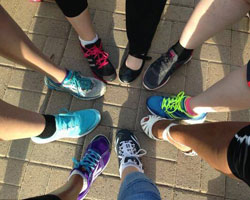Walk Kansas lasts eight weeks, but benefits can go much longer
This year’s program runs April 3-May 28.
 Released: March 2, 2016
Released: March 2, 2016
MANHATTAN, Kan. – A couple of years ago, Deb Monzon was looking for ways to keep her colleagues moving. That’s part of her job as the employee wellness director at Cloud County Community College in Concordia, Kansas. What she found was the Walk Kansas program, which fit the school’s effort to increase wellness among its employees.
Walk Kansas is an eight-week K-State Research and Extension program that this year runs April 3 through May 28. It is open to all Kansans. During the program, teams of six people, one serving as a captain, work toward a common goal – typically to walk at least 150 minutes per person per week, which collectively is enough to walk 423 miles over the eight weeks. Though the team does not actually walk across Kansas, 423 miles is the equivalent of the distance across the state.
Information and registration is available on the website. Online registration is available March 4. Signup is requested by March 25. Registration is also available at K-State Research and Extension offices across the state.
Although individuals report their weekly activity as part of a team, it doesn’t mean they must walk together as a team, although some teams do. Individuals report their weekly activity, and the team’s totals are tallied every week. It’s common for a family or a group of friends or co-workers to register as a team, but some teams are made up of people in different communities.
“Walk Kansas is what got us all started,” said CCCC’s Monzon, who works with K-State Research and Extension agents Deanna Turner and Pat Gerhardt on implementing the program. In 2014, nine teams or about 54 staff members and spouses from CCCC participated. The number grew to 90 participants in 2015, including staff from the college’s Junction City campus. This year, the goal is to have at least 20 teams from CCCC participate.
“People realize, ‘I can do 30 minutes a day,’” Monzon said.
“I am always happy when (Walk Kansas) starts, because I am motivated to walk more when I am on a team, as I don’t want to let my teammates down,” said JoAnne Balthazor, program director for allied health at CCCC.
For the past two years, CCCC employees covered by the school’s health insurance policy have had a portion of their premiums refunded to them. Monzon said she believes there’s a correlation between the insurance rebates and the school’s participation in Walk Kansas, which has helped employees become healthier.
What CCCC is doing – making Walk Kansas part of its effort to enhance its employees’ health – is an example of how companies, schools, families and individuals can use the minimal-cost program to reduce stress and fight off unwanted pounds, said Sharolyn Jackson, K-State Research and Extension family and consumer sciences specialist and Walk Kansas coordinator. Walking also combats depression and improves heart health.
Teams that want a greater challenge can choose to take a meandering, indirect trek across the state (figuratively) walking from Troy in extreme northeast Kansas to Elkhart in southwest Kansas, which totals 750 miles, Jackson said. A third option is to walk the equivalent of the perimeter of Kansas – 1,200 miles – with each person on a team logging six hours per week.
Chronic disease, including obesity, is responsible for more than 70 percent of health care costs, Jackson said.
The U.S. Department of Health and Human Services recommends at least 150 minutes of moderate and/or vigorous activity a week, and muscle strengthening activities are recommended at least two days per week. But less than half of Kansas adults meet the minimum recommendations for physical activity, and just 19 percent eat the recommended amount of fruits and vegetables, Jackson said.
“Those reasons and more are why we developed Walk Kansas,” Jackson said of the program that is in its 15th year and reaches more than 16,000 Kansans annually. “It’s a low-cost, fun way to get people moving and encourage a healthy way of living.”
Sidebar:
Walk Kansas has a new website
MANHATTAN, Kan. – Walk Kansas, the wellness initiative available to all Kansans that promotes physical activity and nutrition, is ringing in its 15th year with a new website. This year, the program starts April 3 and runs eight weeks until May 28.
“We’ve improved the ease with which participants and team captains can register and access information online,” said Sharolyn Jackson, Walk Kansas coordinator. “We’re also starting about two weeks later than we typically have, to take better advantage of the warmer spring weather.”
-30-
K‑State Research and Extension is a short name for the Kansas State University Agricultural Experiment Station and Cooperative Extension Service, a program designed to generate and distribute useful knowledge for the well‑being of Kansans. Supported by county, state, federal and private funds, the program has county Extension offices, experiment fields, area Extension offices and regional research centers statewide. Its headquarters is on the K‑State campus in Manhattan.
Story by:
Mary Lou Peter
mlpeter@ksu.edu
K-State Research and Extension
http://www.ksre.k-state.edu
For more information:
Sharolyn Jackson – 785-532-2273 or sharolyn@ksu.edu
